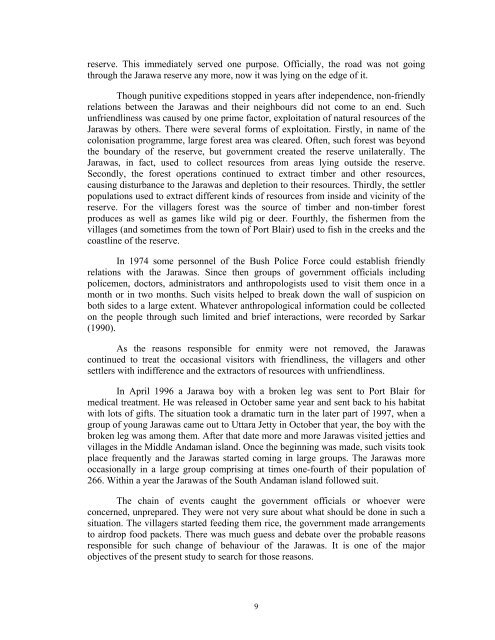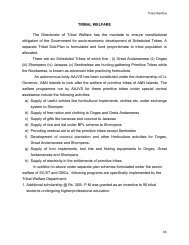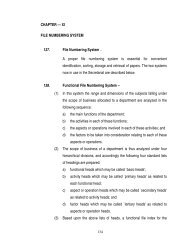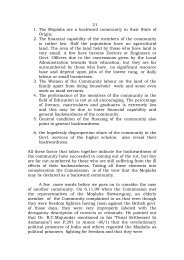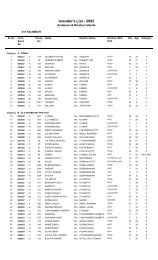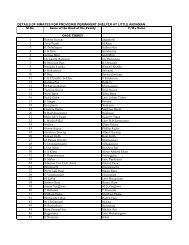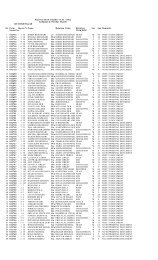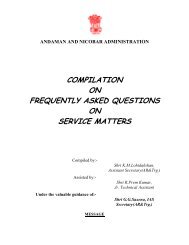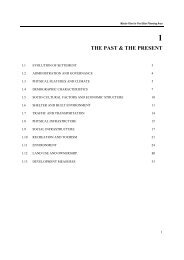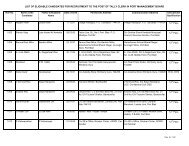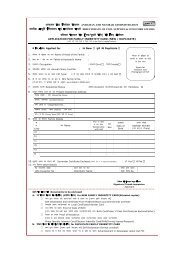1 Introduction - Andaman and Nicobar Islands
1 Introduction - Andaman and Nicobar Islands
1 Introduction - Andaman and Nicobar Islands
Create successful ePaper yourself
Turn your PDF publications into a flip-book with our unique Google optimized e-Paper software.
eserve. This immediately served one purpose. Officially, the road was not going<br />
through the Jarawa reserve any more, now it was lying on the edge of it.<br />
Though punitive expeditions stopped in years after independence, non-friendly<br />
relations between the Jarawas <strong>and</strong> their neighbours did not come to an end. Such<br />
unfriendliness was caused by one prime factor, exploitation of natural resources of the<br />
Jarawas by others. There were several forms of exploitation. Firstly, in name of the<br />
colonisation programme, large forest area was cleared. Often, such forest was beyond<br />
the boundary of the reserve, but government created the reserve unilaterally. The<br />
Jarawas, in fact, used to collect resources from areas lying outside the reserve.<br />
Secondly, the forest operations continued to extract timber <strong>and</strong> other resources,<br />
causing disturbance to the Jarawas <strong>and</strong> depletion to their resources. Thirdly, the settler<br />
populations used to extract different kinds of resources from inside <strong>and</strong> vicinity of the<br />
reserve. For the villagers forest was the source of timber <strong>and</strong> non-timber forest<br />
produces as well as games like wild pig or deer. Fourthly, the fishermen from the<br />
villages (<strong>and</strong> sometimes from the town of Port Blair) used to fish in the creeks <strong>and</strong> the<br />
coastline of the reserve.<br />
In 1974 some personnel of the Bush Police Force could establish friendly<br />
relations with the Jarawas. Since then groups of government officials including<br />
policemen, doctors, administrators <strong>and</strong> anthropologists used to visit them once in a<br />
month or in two months. Such visits helped to break down the wall of suspicion on<br />
both sides to a large extent. Whatever anthropological information could be collected<br />
on the people through such limited <strong>and</strong> brief interactions, were recorded by Sarkar<br />
(1990).<br />
As the reasons responsible for enmity were not removed, the Jarawas<br />
continued to treat the occasional visitors with friendliness, the villagers <strong>and</strong> other<br />
settlers with indifference <strong>and</strong> the extractors of resources with unfriendliness.<br />
In April 1996 a Jarawa boy with a broken leg was sent to Port Blair for<br />
medical treatment. He was released in October same year <strong>and</strong> sent back to his habitat<br />
with lots of gifts. The situation took a dramatic turn in the later part of 1997, when a<br />
group of young Jarawas came out to Uttara Jetty in October that year, the boy with the<br />
broken leg was among them. After that date more <strong>and</strong> more Jarawas visited jetties <strong>and</strong><br />
villages in the Middle <strong>Andaman</strong> isl<strong>and</strong>. Once the beginning was made, such visits took<br />
place frequently <strong>and</strong> the Jarawas started coming in large groups. The Jarawas more<br />
occasionally in a large group comprising at times one-fourth of their population of<br />
266. Within a year the Jarawas of the South <strong>Andaman</strong> isl<strong>and</strong> followed suit.<br />
The chain of events caught the government officials or whoever were<br />
concerned, unprepared. They were not very sure about what should be done in such a<br />
situation. The villagers started feeding them rice, the government made arrangements<br />
to airdrop food packets. There was much guess <strong>and</strong> debate over the probable reasons<br />
responsible for such change of behaviour of the Jarawas. It is one of the major<br />
objectives of the present study to search for those reasons.<br />
9


